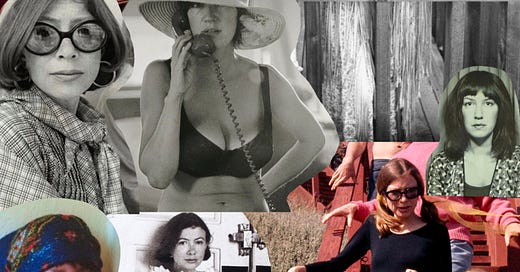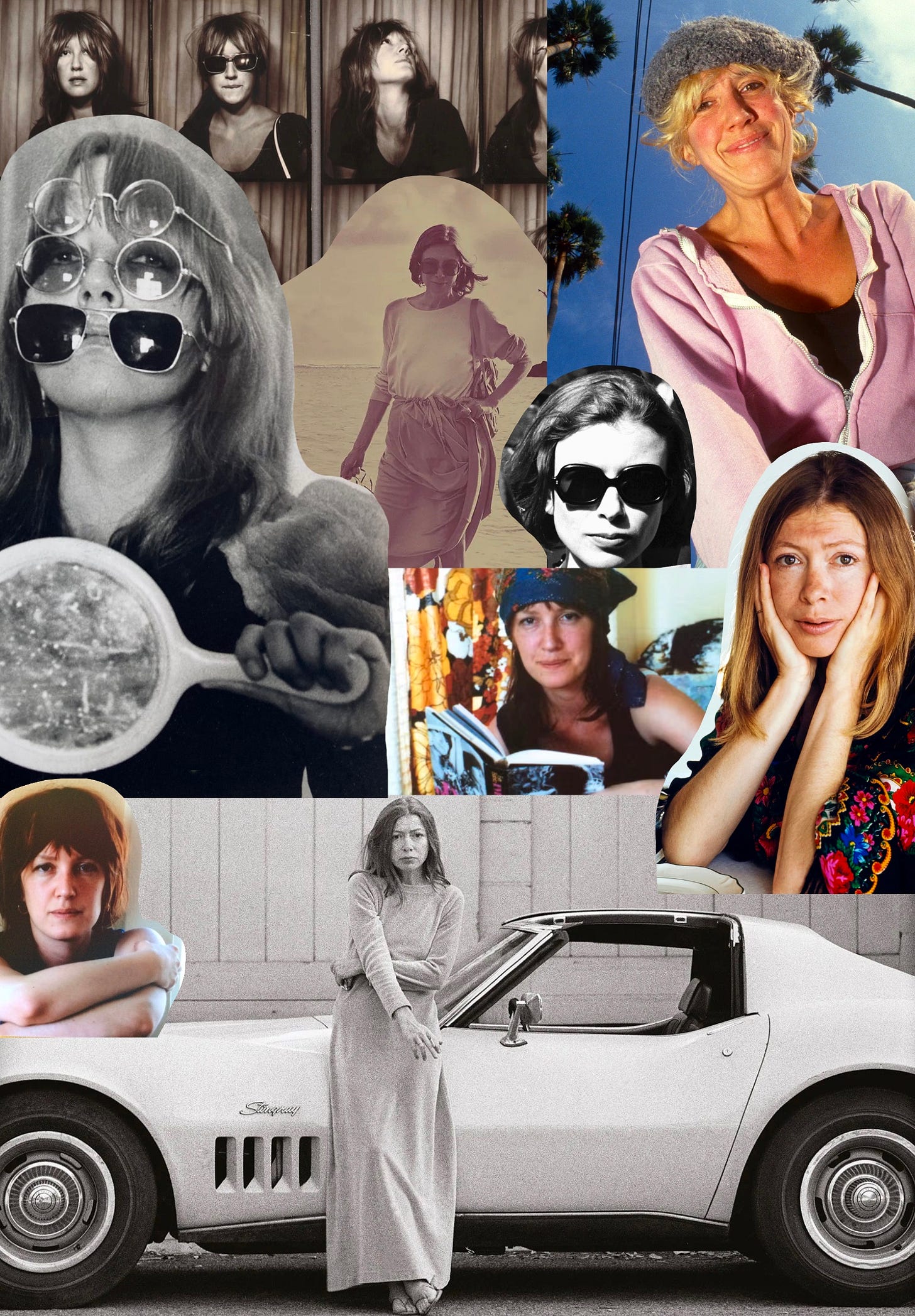Lili Anolik has been living the dream. Befriended Eve Babitz in her later years, privy to all the stories and gossip, granted by Eve’s sister Mirandi to look through a previously unopened box of letters, photographs, diary entries and drafts, discovered details of the relationship between Eve and Joan Didion, conducted thousands of interviews with their inner and outer circles, and then wrote a book about them. One small hitch though, she dumps her opinion all over it.
As a fan of both Babitz and Didion, I was obviously excited for it’s release. I didn’t feel the need to know the premise, just the title Didion and Babitz was enough for me. Then the reviews came through, and then the TikToks, and the people were not happy. Some were even scathing and I needed in on the anger. “How bad could it be?” I thought, as I sat down to read the first page. Pretty bad, as I was already shaking my head by the end of the introduction. The reviews and fuming TikToks were right, it’s an unbalanced, thus frustrating read. You can’t really start a book claiming that you’ll expose the real Joan Didion, a person you never met and then proceed to shit on simply because you don’t like her, without causing an uproar. Many a disapproving and frustrated expression graced my face on these pages. Therefore, it was quite a surprise there were a few chapters that I did really enjoy, so we’ll start with the positives.
After the infuriatingly condescending “To The Reader” introduction, I didn’t actually expect to enjoy any of the book, so after a few chapters in I was surprised to be quite liking it. When Anolik isn’t being a smart arse, and we’re allowed to get lost in the worlds of Babitz and Didion, the writing is fun, and even sparkles at times. Learning about the players who played in both ladies’ circles is definitely the strength of the book. Finally finding out the real names, details and relationships behind the pseudonyms was particularly fun. Over my years of reading their works, I’ve been able to guess a few here and there (figuring out Gram Parsons at the time where I didn’t know a lot about him was a particular triumph), but there were many, especially within the art and literary worlds, I would never have known. Now that I do, I’m dying to reread certain works through the lens of my newfound knowledge.
There are other strengths; fun little tidbits such as Harrison Ford’s carpentry skills, Jim Morrison through a lover’s eye, as well as details of the Troubadour scene which I’d love to time travel to. But of course the biggest is the obvious hours and hours of research with and on Eve Babitz. Other than details in her semi and full-blown autobiographical works, I didn’t know a lot about Eve, so I’m grateful for this abundance of knowledge. Although Anolik probably didn’t need to have her tongue so far up Babitz’s hole…
Which brings me to all the things I didn’t enjoy. Starting with the newly discovered letter, where Eve tears Joan a new one, and is the starting point/premise of the whole book. A few issues though, as 1. We never see the letter, a picture of it would have been nice. 2. Anolik edits the letter. She tells us what she wants us to know, and admits to correcting spelling mistakes and taking out what she deemed unnecessary. 3. She bases her argument of a rivalry between the two on this letter. This unsent letter. While this letter is obviously telling of Eve’s emotions about Joan, it also was never sent, hinting it could’ve been a vent letter. Imagine if our vent letters, diary entries or notes on our phones had been discovered without context after we died? We the reader have to put all our trust in Anolik regarding this letter, and I’m not sure she’s quite capable of reassuring any pre-existing trust issues. JUST SHOW US THE LETTER.
When Anolik is being a smart arse, her writing is unbearable. I usually enjoy the breaking of the fourth wall, relish a cheeky aside from the author, but this was relentless. So, Reader… Let me explain Reader… Reader, you’ve guessed it… Okay Reader… Let’s circle back, Reader… Enough Anolik, enough. We haven’t established a friendly relationship, just get on with it and stop wasting ink. It most certainly did not help that after every Reader there was the most condescending explanation of something simple. Please do not explain to me that this book isn’t linear and that’s why Marilyn Monroe will die more than once. I know how reading and death works, thank you very much. If I’m reading a book about Eve Babitz and Joan Didion, that means I’ve read one, if not, both of these women’s books, which means I’m of a certain reading age. Please let go of my hand.
I read in another review that they found Anolik to be quite tabloid-y, and that this often reads as a first draft, and I agree. Similar to Eve, I love a bit of gossip. But good gossip, fun gossip, harmless gossip I can share with my Mum. Not mean or hurtful gossip, which Anolik seemingly likes to divulge in. The chapter about Joan’s husband, John Gregory Dunne was particularly spiteful, and, to me, a bit morally questionable. I probably shouldn’t be repeating it, but I feel that she should’ve been pulled up on it. When trying to explore why John Gregory Dunne was such a volatile man, Anolik bypasses nephew Griffin Dunne’s retelling in his fabulous memoir of his dad and uncle growing up in a volatile household, and goes straight to the rumour that he was closeted. Then instead of any nuanced exploration on why being gay or bisexual might’ve been this struggle for Dunne (the times, his strict Catholic upbringing, how his brother ostracised himself when he initially didn’t want to be open with his sexuality), she shows disgust. Disgust that he *possibly* lived a lie, disgust that he *possibly* had an arrangement with Joan, and disgust that Joan went along with this *possible* arrangement to advance her career. So what if they did, Anolik? They’ve both been dead for a while, Didion four years, Dunne twenty-two, what exactly is this conversation based on rumours of acquaintances going to achieve. Let’s not out people who didn’t want to be outed, especially when we don’t know the truth. It’s gauche and tabloid-y.
The biggest peeve for a lot of people is the outright Joan-bashing. Anolik starts the book by stating she’ll be revealing the true Joan Didion and warns the reader not to be a baby about it, then spends the rest of the book using everything she can against her: the Eve letter, her weight, her migraines, her marriage, her ambition, her coldness. Some of this is already well-documented, we know about her ambitions and coldness, but the other things, like accusations of a sham marriage and eating disorder, are just mean. In the year of 2025, when talking about a slim person’s love for cooking, we do not need to follow it up with, “Yet how much of this delicious food could Joan, tipping the scales at ninety pounds, have consumed?” She is far more forgiving and understanding of Eve’s messiness, and how she was paid to write about her fabulous self because she was born into the art world, than she is of Joan’s messiness and how she ruthlessly played the men’s game for her career. While at the end she does try to say that she has respect for Joan and lists qualities that she likes, about halfway through the book there’s a whole chapter dedicated to her dislike of Didion, calling her “part princess, part wet blanket.” The bias is very, very clear throughout.
I think for me, the biggest overriding issue is, did we need to pit these women against each other? Why does one need to be better than the other? Or cooler? Or sexier? Why is Babitz’s work seen as more legitimate because she was a participant, and Didion seen as a poser because she was an observer? The joy of reading their works is because you get to see the inside and outside perspective, the many layers of the same person/place/scene/event. They work best together, not against.
If Anolik had been more honest about her one-sidedness from the beginning, I might’ve been more forgiving. If the book’s premise was Joan in the eyes of Eve, Eve’s Didion if you will, it would’ve worked better. However, the eyes of Eve that Anolik is seeing through is solely based on one unsent letter, as well as the influence of a plethora of Joan-haters, so we can’t even trust if these actually are the eyes of Eve. Where the book shines is where we’re allowed to get lost in 1960s/70s L.A., the people they both knew, the places they went to, the scenes they participated and observed, and maybe this is where the book should’ve stayed. No unnecessary and hurtful gossip, some more balanced sources, and to actually have seen the letter untouched. As much as I was frustrated with the book, I did enjoy learning more about Eve Babitz, and their mutuals, and I do think it is worth a read to get involved with the drama it has stirred online…
Do any of you guys have a preference for Eve or Joan? Or are you like me who adores them both?






I had to google Anolik “dear reader” to make sure I wasn’t the only one getting annoyed. How did an editor let her keep so many of those interruptions!?